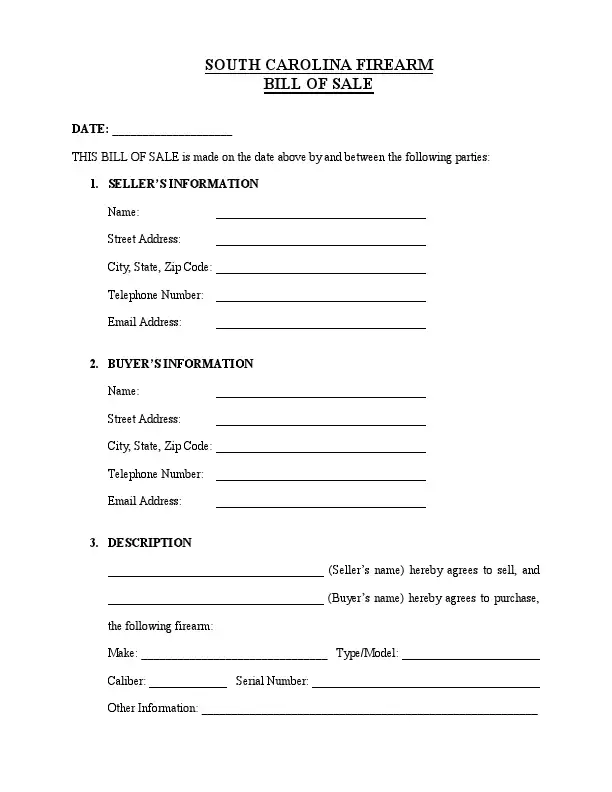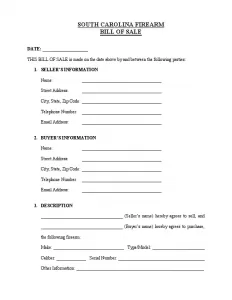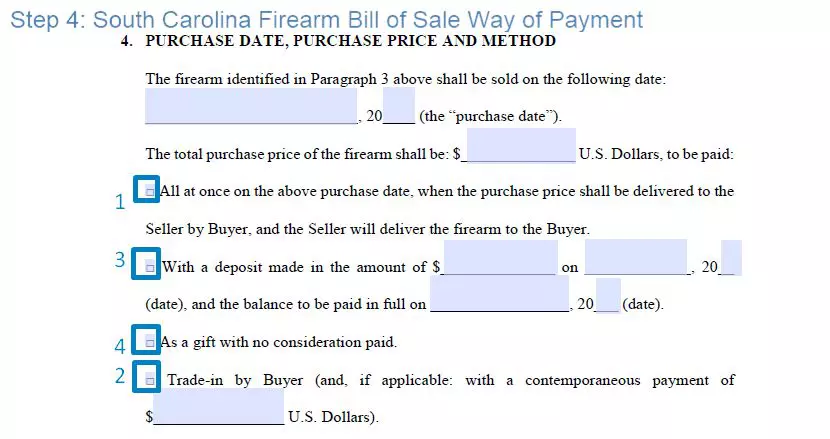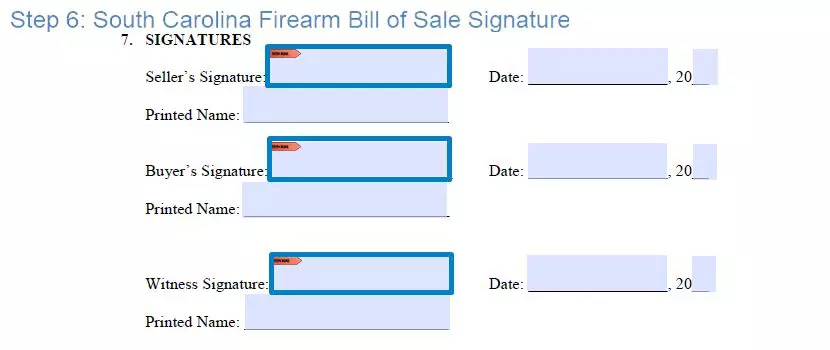South Carolina Firearm Bill of Sale Form
You may need to prepare a South Carolina firearm bill of sale in case of selling or buying a firearm in this state. Find out when you need to use the bill of sale template and whether you need to register a gun.
South Carolina bill of sale forms – find other bill of sale documents for South Carolina together with instructions.
In case you want to refresh your memory on the basics of a bill of sale, use our comprehensive guide – https://formspal.com/bill-of-sale/.

Build Your Document
Answer a few simple questions to make your document in minutes
Save and Print
Save progress and finish on any device, download and print anytime
Sign and Use
Your valid, lawyer-approved document is ready
Is It Legal to Purchase a Firearm in South Carolina?
The actions with firearms in the State of South Carolina are regulated by state law. If something is uncovered by the local legislation, it is regulated by federal gun laws. You can buy a gun if you do not belong to prohibited possessors. No registration is required.
You can find licensed gun dealers in South Carolina to buy a firearm. In this case, you will go through a standard procedure according to federal law. At the store, you will fill out ATF Form 4473 — Firearms Transaction Record. The dealers will run a check in the National Instant Criminal Background Check System (NICS). That is done to make sure that you do not belong to prohibited possessors. Once your application is approved, you can buy a firearm.
No background check is required for transactions between individuals in South Carolina. You should use a South Carolina firearm bill of sale. This document will serve as proof of ownership. You can find a free template of the form on our site. Remember to fill out all the fields, including the following:
- Names of both parties
- Details of the sale (date, price)
- A description of a firearm
The document should be signed by both parties of the deal. Read full article about firearm bills of sale to learn more about the proper way to fill them out.
Is It Legal to Sell a Firearm in South Carolina?
It is legal to sell firearms in South Carolina regularly only if you are a licensed gun dealer. You can apply for it with the Bureau of Alcohol, Tobacco, Firearms, and Explosives (AFT). No permit or license is required for a one-time transaction.
Can You Carry a Firearm in South Carolina?
Concealed carry is allowed only with a Concealed Weapon Permit (CWP). You will need to fill out a permit application, which is available in a printable PDF format. Then, you will need to mail it along with other required documents, such as a copy of your driver’s license, to the SC Law Enforcement Division (SLED). Please read the full list of requirements for obtaining CWP in this state. Open carry is prohibited in South Carolina even with CWP.
South Carolina Firearm Purchase Details
| Subject | Long Guns | Hand Guns |
| Registration of a Firearm | Not required | Not required |
| Permit to Purchase | Not required | Not required |
| Concealed Weapons Permit Fee | $50 | |
| Background Check for Private Sales | Not required | Not required |
| Persons Prohibited from Carrying Firearms | South Carolina Code of Laws, Section 16-23-30(A) | |
Download a Free South Carolina Firearm Bill of Sale Form

How to write a South Carolina Firearm Bill of Sale?
The directions listed below are centered around our custom South Carolina firearm bill of sale. Nevertheless, it is best to consider the standard document when it’s provided by the local authorities.
Step 1: Specify the document’s creation date.

Step 2: Type in the specifics of each party (seller and purchaser):
- Name
- Street
- City of residence
- State of residence
- Zip code
- Phone
- Valid email address

Step 3: Provide the particulars of the firearm:
- Make (manufacturer)
- Type or model
- Caliber
- Serial number
- Other details

Step 4: Select the way the buyer will pay for the firearm and for how much.
Type in the sale date and specify the full sum that must be paid for the gun. Once that is done, you will need to check the way of transaction:
- Giving the full sum as a one payment. This one is quite straightforward: the gun owner is given the full amount of money from the purchaser in one transaction and presents the firearm to the purchaser within the same day.
- Trade-in. In case this option is chosen, the selling individual trades their gun presented by the purchaser. If the buyer’s firearm is cheaper, they will need to even that out with a further payment. You will also have to include the information about the buyer’s firearm.
- Installment payments. Using this method, you must indicate the dates when the buyer has to provide the first and the last payments, as well as their amounts.
- Giving the firearm as a gift. In this case, no consideration is paid.
Now, indicate how the buyer pays:
- Cash
- Cheque
- Cashier’s cheque
- Money order

Step 5: Go over standard provisions and ensure all parties understand them.
They usually state that the purchaser acquires the firearm in “as-is” condition and is liable for it after the transaction is completed.

Step 6: Put your signature(s) in the corresponding fields.
For most states, the signature of the purchaser isn’t required. However, it’s advised to get the bill of sale signed by all parties. To play it safe, the parties could choose somebody who’ll attest the deal and sign the document too.

Step 7: Notarize the form
Although notarization is almost never mandatory, it functions as one more way to shield against legal problems. Another way to avoid legal issues is to keep the bill of sale with all the important details about the deal in your personal records.
